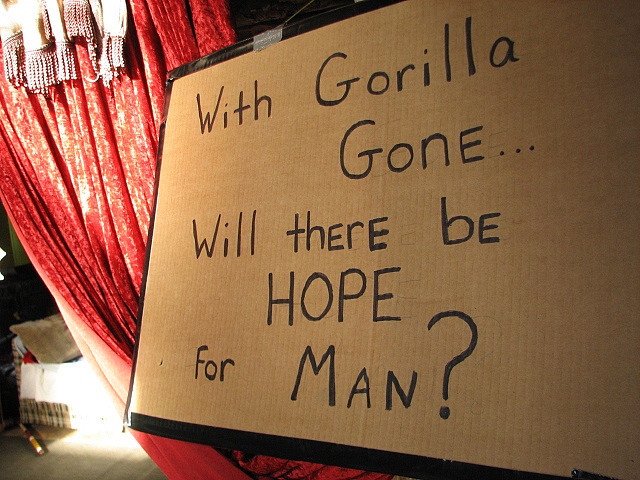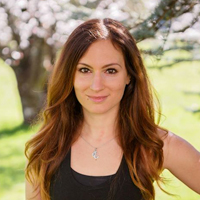I should have known this day would come—I tried to deny it, ignore it, fight it, and justify it ever since I was old enough to understand what was being served to me at dinnertime.
I just don’t think I can anymore (Paleo people, cover your ears)—I can’t eat meat anymore. I just can’t.
Even though, as a fitness professional, I know it’s an excellent source of protein and essential amino acids and will still recommend it’s consumption to my clients (preferably lean cuts that came from locally and ethically raised livestock, mind you). But I can’t eat it.
Although I blame this decision partly on my dislike for red meat, my high cholesterol levels, some bad childhood memories, a love of animals and how terrible animal agriculture is for the environment, there are two other reasons why I’m going vegetarian-bordering-on-vegan (’cause I can’t eat dairy).
And one of them has to do with a talking gorilla.
A few months ago, I was discussing the future of food with a coworker and how if every country ate like the United States we have no land left to live on. The next day, she brought in the book “Ishmael” by Daniel Quinn for me to read. She told me it was one of those books she has never forgotten, which is reflected in an essay about the book that was published in the Chicago Tribune two years ago:
“I now divide the books I have read into two categories—the ones that slap me in the face and the ones that don’t.
“Ishmael” slapped me in the face: Humanity isn’t destroying the earth. One culture that now rules the globe is destroying the Earth. That is our culture, whose objective is to bulldoze everything in its way and to put everybody at the wheel. The objective is food production and growth and the target is any forest and any life—plant, animal or human—that occupies it. This is true whether in Brazil, China, Russia or the United States. Our culture won’t stop until it devours everything, including itself.
My grandparents passed this culture to my parents, who passed it to me. I passed it to my kids, who, without doubt, will pass it to theirs. We do so unwittingly, much the way we commuters sleepwalk en masse from the train to our office buildings, unconscious but of our iPhones. As the book points out, we’re on a crash course.”
~ Pete Reinwald for Chicago Tribute
“Ishmael”, a story about how our current culture came to be and how we’re on a crash course to destruction thanks to our Western-world appetite for expansion and consumption (as told to the narrator by a giant gorilla named Ismael in a tiny room), was written in the late 70s but feels like it could have been written for today’s audience. It made me think about how I contribute to and continue to perpetuate our destructive Western-world culture.
Although I’m conscious of the environment and do things such as recycle, walk to work and wear extra layers instead of turning on the gas; buy natural, organic and environmentally friendly cleaning and beauty products; try to reduce waste by using my own containers; and purchase locally made and grown goods where possible, I still get caught up in iPhones, finding cheap work clothes at Target and going on all-inclusive vacations.
Since I’m not going to give up all my worldly goods and go live like a monk on an organic farm on a tiny island in the Pacific Ocean for the rest of my life—I still have people whom I love and support and a career that helps others get happy and healthy, so becoming a hermit is not an option—I felt like maybe there was more I could do.
In the book, Ishmael and the narrator discuss how not all cultures are bad. Once upon a time, we all lived much like other species did: we took what we needed to survive, nothing more, nothing less. We thrived like this for thousands of years. Yes, we hunted and ate meat, but the majority of our diet consisted of root vegetables, fruit and other foraged food. Meat was a side dish, not the main entree of every single meal. But then one culture decided that instead of living off the land, we should own it, take it over and make it provide for us—this clever culture created agriculture, which allowed our human population to explode and thrive.
According the Ishmael (and all history texts), things didn’t really get bad (or good, depending on how you look at it) until the Industrial Revolution. That’s when we set sail across the Pacific and told (*cough* forced *cough*) the other cultures to join us; to take the land and make it ours (*cough* theirs *cough*).
So what does this have to do with becoming vegetarian?
After reading the book, I kind of felt like a jerk for being a part of this culture that’s destroying the planet, a culture, that came in and said, “Nnnnope!” to all the animals, plants and other cultures, wiping them from the face of the Earth like you might swipe a collection of china off a table with one big swoop of your hand, letting it fall to the floor and shatter into a million little pieces. Of course, I grew up in this culture and it’s all I know but, as an anthropology major, I’m definitely aware of what it’s doing to the environment and what it means for the future of the human race.
And that’s where the other reason for not eating meat comes in: Kindness.
As I’m getting more into yoga and meditation, I’m learning more about the teachings of Buddha, as both practices are spiritually linked. Buddhism, yoga and mindfulness practices focus on mettas, or teachings, that show us how to look inwards to find peace and happiness, to walk lighter and to be more compassionate towards everything in this world.
(I know you’re probably thinking I should probably just pack up my yoga mat and move to Maui now… but just hear me out.)
One such metta is loving-kindness, or compassion. Many Buddhists and yogis are vegetarian for this reason—as meat consumption requires the harming and killing of animals—though it’s not a requirement of the spiritual practice.
For me, knowing what I know about animal agriculture now thanks to articles like this, eating animal flesh brings up some conflicting emotions, especially since I know I can get everything I need to be healthy from a whole foods, plant-based diet.
Please know that I’m not going to get all vigilante-vegan and remind you about the terrible living conditions of livestock and the fear experienced moments before slaughter every time you bite into a burger. (I tried that when I was eight years old and got in trouble.) I know meat is tasty and can be a part of a healthy human diet; we are omnivores, after all.
Would the world be in a better state if everyone ate a plant-based diet? I imagine it would. I think if everyone in North America and Europe cut out just one meat entree per week we’d be in a better state than we are now.
And maybe that’s all it will take.
Further reading:
Humane Meat: It’s Not Humane for Nature.
How to Really Eat Like a Hunter-Gatherer: Why the Paleo Diet Is Half-Baked.
National Geographic Magazine: Carnivore’s Dilemma.
Relephant:
Compassionate Vegetarianism: Meat is more than just Dead Animals.
Author: Bri Wilson
Editor: Katarina Tavčar
Photo: Anathea Utley/Flickr







Read 1 comment and reply